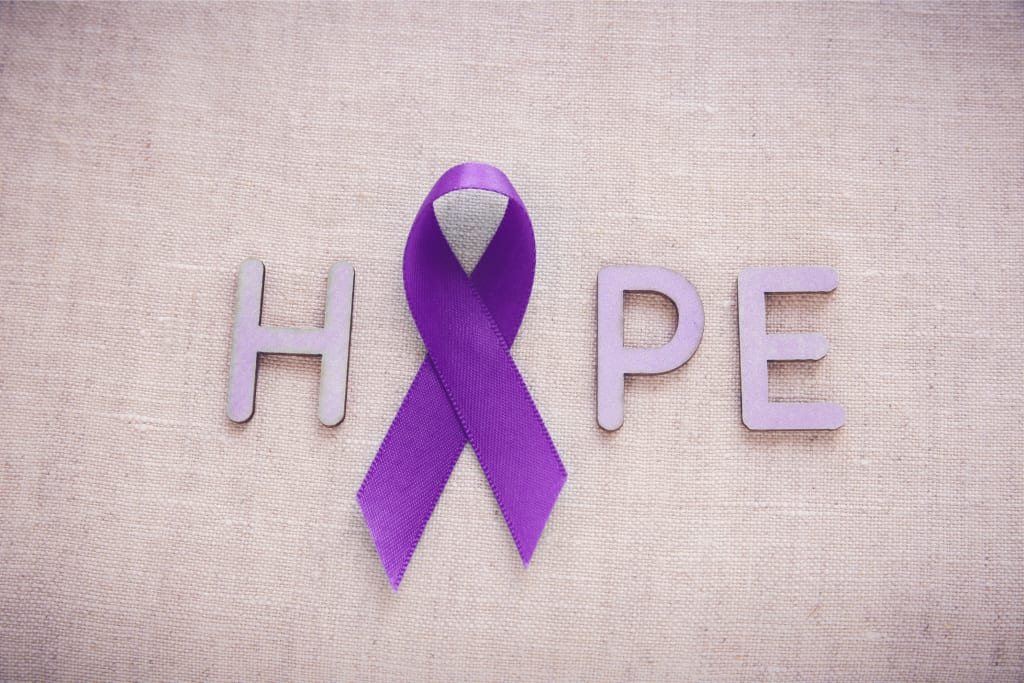If You Have Epilepsy, This Could Change (Or Save) Your Life
Medical breakthrough promises early seizures warning

Epilepsy is more common than you probably think. But it still carries a stigma that for many people, myself included, has left lasting scars.
Events like Purple Day (March 26) and various national awareness months do their best to educate people about an illness that can, I admit, be frightening to encounter.
One in 50 of us will develop epilepsy at some stage of our life. More than 65 million people across the world suffer from the neurological condition today.
For those of us who live with epilepsy, the news of a new medical breakthrough, revealed on February 26, 2021, is potentially life-changing. And life-saving.
A research team at the University of Southern California has developed a mathematical model they claim can give people with epilepsy an accurate warning that they are likely to experience a seizure.
The model works by learning from data collected from an electrical implant in the patient's brain.
It has been found to give warnings between five minutes to one hour ahead of when a seizure is likely to occur.
The research was published in the Journal of Neural Engineering. One of the authors, Dong Song, research associate professor of biomedical engineering at USC Viterbi School of Engineering, sums up how significant this early warning would be to a person who suffers from epileptic seizures:
"It could be as simple as just alerting the patient their seizure is coming the next hour, so they shouldn't drive their car right now, or they should take their medicine, or they should go and sit down. Or ideally in future we can detect seizure signals and then send electrical stimulation through an implantable device to the brain to prevent the seizure from happening."
This may be early days for the technology, but the results and potential are extremely exciting.
Another authour of the report, Charles Liu, professor of clinical neurological surgery and director of the USC Neurorestoration Center, adds:
"This is hopefully, going to change the way we deal with epilepsy going forward and it's driven by the needs that have been in place for a long time, but have been highlighted and accelerated by COVID."
Before I tell you about my personal story, I'll fill you in on some startling facts…

Epilepsy Eye-Openers
You'll find all these stats supported by the Epilepsy Foundation and the Epilepsy Society.
- You can die from epilepsy. The most common cause of death is sudden unexpected death in epilepsy (SUDEP), which claims the lives of one in every 1,000 people with epilepsy each year. People can also die from suffering prolonged seizures.
- The risk of premature death in people with epilepsy is up to three times higher than for the rest of the population.
- In many parts of the world, people with epilepsy - and their families - still suffer from discrimination.
- In China and India, epilepsy is still seen as a valid reason for either prohibiting or annulling a marriage.
- Saying that, it was only in 1971 that the United Kingdom stopped permitting the annulment of a marriage on the grounds of epilepsy.
- And in the United States of America, it was legal to deny people known to suffer seizures access to restaurants, theatres and other public buildings - right up until the mid-1970s.
- Epilepsy is a neurological condition - thus affecting the brain - causing repeated seizures.
- There are more than 65 million people with epilepsy in the world, with an estimated five million diagnosed with the illness each year.
- One in 50 of us will develop epilepsy at some stage of our life.
- Epilepsy is diagnosed after a person has had two or more seizures - one in 20 people will actually experience a one-off epileptic seizure at some time in their life.
- Seizures occur when there is a sudden interruption in the workings of the brain.
- There are more than 40 different types of seizure - not everyone falls to the ground, shaking, like I have done in the main. Some people simply stare into space for a few seconds - that has happened to me, too, and can be both embarrassing and confusing.

- You will have seen warnings about strobing or flashing lights in films or music videos, perhaps, because 3% of people with epilepsy have photosensitive epilepsy, and these type of lights can trigger seizures.
- Most seizures happen suddenly and without warning - which is why this latest breakthrough is so important.
- Most seizures only last a few seconds or minutes and stop by themselves. They can happen by day, or at night, in a person's sleep.
- Epilepsy can start at any age, but is most commonly diagnosed in people under 20 and people over 65.
- Epilepsy can be difficult to diagnose, and the cause of the disease is still unknown in about half of all cases.
- It is usually treated with anti-epileptic drugs, athough surgery can also be an option, sometimes removing the part of their brain that causes the seizures.
- With medication, up to 70% of people with epilepsy have their seizures controlled - which can mean they stop happening. Or in my case, they come back to haunt me every decade or so.
- Although people with epilepsy can do most of the things that people without epilepsy can do (with the exception of potentially dangerous things like driving or operating machinery), the seriousness of the condition should not be underestimated.
- Treatment does not work for everyone - there are more than a people in the United States alone who have uncontrolled epilepsy.

My Story
Forty years ago, I was diagnosed with epilepsy. It would change and shape my life, more than I ever imagined it would. Despite being a writer for 30 of those years, this is the first time I have felt able to pen any words about it.
I've got on with my life and achieved many things despite my illness, but have encountered many challenges.
Living with a misfiring brain. began, for me, when I was 10 years old. It was the morning of our summer family holiday, travelling 150 miles to a friend's caravan in the English Lake District. What an adventure. I loved it there. I was so excited as my brother and I collected snacks for the journey from the kitchen.
The next thing I remember, I was lying on the sofa in the next room, dazed and confused, feeling the sting of a graze down my right cheekbone.
My parents were obviously concerned – terrified no doubt – at what they had witnessed. I had suffered my first epileptic fit – as we called them back then – falling suddenly to the hard floor, scraping my face down a wall on the way, writhing around uncontrollably for a few minutes, my eyes vacant, my tongue hanging out, groaning and thrashing.
I only know this because of what I've been told and what I've read, of course. It must have been horrible for my family to witness for the first time.
This was later diagnosed as a grand mal seizure, more recently renamed a tonic-clonic seizure.
My abiding memory was of crushing disappointment when my Dad told me we couldn't go on holiday because of what had happened – we had to see a doctor instead.
I believe the seeds were sown there and then of my vow never to let my illness get in the way of what I wanted to do. Epilepsy would come back to bite me many times over the years, however, to remind me that I'm not always in charge.

Things could have been so much worse I guess…
I'm not going to go through all my memories of every seizure, but there are some stand-out moments that help explain why it is so important to be able to predict when an epileptic seizure might occur.
The Bicycle Crash
I signed up for a sponsored bike ride with my school, just a 15-mile trek to and from the seaside but a fair distance for an 11 year old. About two miles in, my brain switched off and I veered left into a ditch. If I'd have fallen to the right, I would have been on the road. I was lifted with my bicycle on to the back of a truck and driven the rest of the way.
Waiting For The Bus
I was standing on the edge of a busy road, waiting for the bus to arrive to take me home after a day at college. The next thing I remember, I am lying half on the pavement, half on the road, the bus on one side of me, an ambulance on the other. I was taken to hospital as a precaution and was fine, other than a groggy head and some cuts and bruises, but the position where it had happened again made me feel extremely fortunate that it had not been worse.
At My Friend's House
After a night visiting a number of bars, I had missed the last bus home so stayed at a friend's house. In the morning, I awoke and suffered a fit. But nobody came to my aid. I remember seeing my friend peering nervously round the door and disappearing again. He returned with his mother, also observing from the partly-opened room entrance. They walked away for some reason. I gathered myself together, walked down the stairs, to be greeted with breakfast and a normal conversation, as if nothing had happened. No more was spoken of the incident, and I am confused about it to this day. A bit of warning might have been nice for me to avoid the embarrassment and go back to bed instead.
On My First Day In A New Job
First impressions count, right? The new boy (I was 21) falling off his chair in the middle of the office and doing some kind of crazy dance on the floor must have been gossip for months. And quite frightening for a lot of my colleagues. Extremely embarrassing for myself.

So Where Am I Now?
I do not have regular epileptic seizures any more, thankfully. Drugs have controlled the condition. However, I still expect to have one at any minute.
After suffering many seizures over a 14-year span, I have lasted between a few years and currently 12 years between seizures.
This is the longest spell I have had without a seizure, but it terrifies me every day that it will happen again.
Some days I get brain fog. Strangely enough, writing about epilepsy has given me the sensation a little. For this reason, I decided a long time ago never to drive, even though I am allowed to get behind a wheel (in the UK at least) if I have gone for two years without an attack (as I always called them).
I cannot risk losing concentration even for a second. It could kill me, it could kill my family, it could kill someone else's family. I won't allow that to be even a possibility.
Not being able to drive has had an impact on my career as a journalist. I have simply not been able to get to a place quickly enough to cover a story on many occasions. But I have done ok, I have always found a way around the inconvenience.

I did suffer a disconnect from normal teenage years, which I still find a little sad. I didn't enjoy the full experience because I was convinced people saw me as a freak, so I stepped back from what was going on around me a fair bit - after being such a gregarious, confident child before this happened to me.
For that reason, I also lacked confidence in building closer relationships at first. Fortunately, I have always found someone willing to put up with me!
Don't worry, I don't need therapy - we don't really believe in that kind of thing in the UK. But I'm in a very happy relationship, I have four children, work for myself and have many wonderful memories to look back on - and hopefully a great many more to make ahead of me.
Epilepsy does not have to define you. But it can scar you. And it can put you in danger.
Any assistance along the way to warn of when a seizure might happen would be welcomed by everyone who suffers, I am sure.

How You Can Help
Please have a read about:What To Do If Someone Has An Epileptic Seizure.
Also, support your country's awareness day or month, as well as Purple Day, an international effort dedicated to increasing awareness about epilepsy worldwide.
It is staged on March 26 every year, and people around the world are invited to wear purple and host events to support epilepsy awareness.
Canada is the only country which officially marks March 26 as Purple Day through its Purple Day Act.
About the Creator
Mark Campbell
Journalist and blogger, editor of greengreengreen.org, on a mission to inform, educate and entertain






Comments
There are no comments for this story
Be the first to respond and start the conversation.